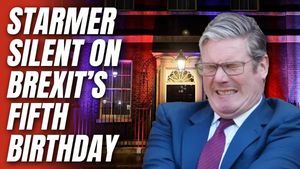Protests erupted across central London today, Saturday, February 1, 2025, as supporters and opponents of far-right figurehead Tommy Robinson clashed rhetorically and physically. Robinson, whose real name is Stephen Yaxley-Lennon, is currently serving an 18-month prison sentence for breaching judicial orders prohibiting him from making defamatory statements against individuals, including allegations against a Syrian refugee.
The protest organized under the name ‘Stop the Isolation’ or ‘Unite the Kingdom’ commenced at midday, with supporters gathering at Sandell Street and Cornwall Road, off Waterloo Road, right outside Waterloo Station. From there, the group planned to march to Whitehall via Westminster Bridge, culminating at the Parliament Square end of the thoroughfare.
Simultaneously, the group Stand Up To Racism arranged for its counter-protest to begin at 11:30 AM from St James’s Street, south of Piccadilly Circus. Their demonstrators marched to Whitehall via Piccadilly Circus and Haymarket, where they too had plans for a rally at the northern end of Whitehall, near Trafalgar Square.
Recognizing the potential for clashes between the two opposing groups, the Metropolitan Police increased their presence across the capital. The police enforced pedestrian access restrictions along Whitehall to separate the opposing protest groups, advising pedestrians not involved in the demonstrations to seek alternative routes between Trafalgar Square and Parliament Square. Police Commander Louise Puddefoot emphasized, “We have officers deployed in significant numbers to provide reassurance to the wider community and to give us the capability to intervene swiftly and decisively if incidents of crime or disorder occur.”
Robinson's supporters are expressing their outrage over his imprisonment, insisting it is politically motivated. They made strong proclamations on social media platforms, especially X (formerly Twitter), with posts stating: “We will proceed to Downing Street. Stand against the isolation of Tommy Robinson. Deliver our message to the establishment.”
On the flip side, the counter-demonstrators, led by Weyman Bennett of Stand Up To Racism, rallied against what they characterized as the growing influence of far-right ideology. Bennett remarked, “We saw the power of mobilizing against the far right in response to last summer’s racist riots. We must bring this anti-racist spirit onto the streets of London and reject the politics of hate.”
The tensions surrounding Robinson's figure have recently been exacerbated by Elon Musk's vocal support of him via social media. Musk's influential posts have drawn sharp criticism from various commentators, including Sir Keir Starmer, who expressed concern over the impact of misinformation on vulnerable communities. Robinson's defenders, motivated by Musk's attention, expressed their determination to mobilize support for his cause.
Commander Puddefoot reflected on the police's level of preparation for the protests, stating they have been engaging with both sides of the protest movement leading up to the events. “What our officers are wearing or the protective kit they are carrying doesn’t change their role at these events. They are there to uphold the law and provide assurance to the public,” she added, reinforcing the expectation of peaceful demonstrations.
These protests come at a time of political sensitivity, with divisions growing wider over national identity and social policy. Robinson has much support from nationalist groups, which claim to speak for many who feel marginalized. Their assertions of victimhood resonate particularly well among those who see themselves as sidelined by mainstream politics.
The contrasting narratives of Robinson's supporters calling for freedom of speech and the counter-protesters asserting the need to combat racism embody the complex social and political fabric of modern Britain. The outcome of these protests could have significant repercussions for political discourse and community relations moving forward.
While police efforts to maintain peace are commendable, the underlying causes of these tensions need urgent attention. Amidst fervent debates on either side, the fundamental question remains: how can society find common ground without sacrificing the values of justice and equality?



